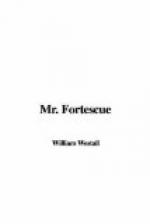He ate very little animal food, limiting himself for the most part to fish and fowl, and invariably spent eight or nine hours of the twenty-four in bed. We often discussed physiology, therapeutics, and kindred subjects, of which his knowledge was so extensive as to make me suspect that some time in his life he had belonged to the medical profession.
“The best physicians I ever met,” he once observed, “are the Callavayas of the Andes—if the preservation and prolongation of human life is the test of medical skill. Among the Callavayas the period of youth is thirty years; a man is not held to be a man until he reaches fifty, and he only begins to be old at a hundred.”
“Was it among the Callavayas that you learned the secret of long life, Mr. Fortescue?” I asked.
“Perhaps,” he answered, with one of his peculiar smiles; and then he started me by saying that he would never be a “lean and slippered pantaloon.” When health and strength failed him he should cease to live.
“You surely don’t mean that you will commit suicide?” I exclaimed, in dismay.
“You may call it what you like. I shall do as the Fiji Islanders and some tribes of Indians do, in similar circumstances—retire to a corner and still the beatings of my heart by an effort of will.”
“But is that possible?”
“I have seen it done, and I have done it myself—not, of course, to the point of death, but so far as to simulate death. I once saved my life in that way.”
“Was that when you were hunted, Mr. Fortescue?”
“No, it was not. Let us go to the stables. I want to see you ride Regina over the jumps.”
Mr. Fortescue had caused to be arranged in the park a miniature steeple-chase course about a mile round, on which newly-acquired hunters were always tried, and the old ones regularly exercised. He generally made a point of being present on these occasions, sometimes riding over the course himself. If a horse, bought as a hunter, failed to justify its character by its performance it was invariably returned.
Sometimes Ramon gave us an exhibition of his skill as a gaucho. One of the wildest of the horses would be let loose in the park, and the old soldier, armed with a lasso and mounted on an animal trained by himself, and equipped with a South American saddle, would follow and try to “rope” the runaway, Mr. Fortescue, Rawlings, and myself riding after him. It was “good fun,” but I fancy Mr. Fortescue regarded this sport, as he regarded hunting, less as an amusement than as a means of keeping him in good health and condition.
Regina (a recent purchase) was tried and, I think, found wanting. I recall the instance merely because it is associated in my mind with an event which, besides affecting a momentous change in my relations with Mr. Fortescue and greatly influencing my own fortune, rendered possible the writing of this book.




